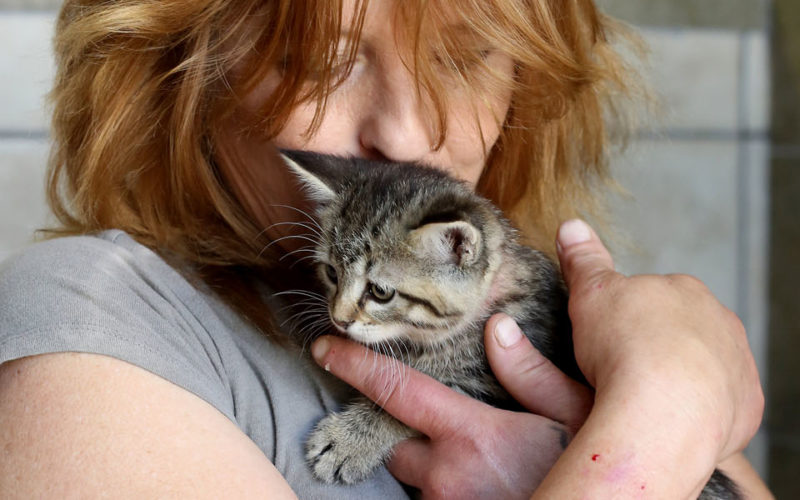Spring means warm air, sunlight and kittens. Lots of kittens.
Animal advocates refer to early spring as the beginning of kitten season. The feline reproductive cycle is influenced by warmer weather and the amount of daylight in a 24-hour period, according to the Animal Shelter Assistance Program in Santa Barbara, Calif.
Feral cats often live in colonies near reliable food sources and shelter. The city has a program for cat colony caretakers, who are trained and supported by the nonprofit Northwest Arkansas Community Cat Project.
Representatives with that organization and Spay Arkansas, in Springdale, visited the city’s Animal Services Advisory Board on May 7.
Marcia Donley, founder of the Community Cat Project and Spay Arkansas, said nationwide about one feral cat exists for every 10 people. That means Northwest Arkansas could have as many as 50,000 feral cats.
The number is probably not that high in reality, thanks to the efforts of volunteers, Donley said.
“As we fix them, they’re just kind of dwindling,” she said.
The American Society for the Prevention of Cruelty to Animals defines feral, or community, cats as those born and raised in the wild or cats that have been abandoned or lost and have turned to wild ways in order to survive.
Community Cat Project, like many other organizations nationwide, uses the trap, neuter and return, or TNR, method to help control the cat population. The cats also have a tip of an ear removed during surgery to keep them from being trapped multiple times, and receive vaccinations for rabies and feline diseases.
Sometimes property owners don’t want the cats returned to the same area in which they are found, said Lea Criss, board chairwoman. The “return” part serves as a crucial aspect of the process, she said.
“You want the fixed cats returned,” Criss said. “If you take those cats out of the picture, then more cats are going to move in in their place.”
Found kittens will make their way to a shelter once they’re old enough for socialization and adoption, around 6 to 8 weeks old. Kittens younger than that are best left with their mother, according to the New York City Feral Cat Initiative. Newborn kittens need to be fed and stimulated every three hours around-the-clock.
Fayetteville has the TNR method written into its city code. Springdale is working on a program with volunteer groups, said Courtney Kremer, animal services director.
“By sterilizing the cats, we are cutting down on the number of kittens that are showing up at the shelter and also reducing the population of these colonies,” she said.
Linda Picken with Fabulous Felines Northwest Arkansas in Bentonville, said she and other volunteers are working to get a TNR program adopted in Benton County.
“It’s just overwhelming every year,” Picken said. “I keep thinking all the cats we take to spay and neuter would help the numbers.”
Officer Gene Page with the Bentonville Police Department said what constitutes a feral cat can be murky, and officers don’t regulate or endorse trapping.
“We’ve had a situation where a neighbor unknowingly trapped what they thought was a feral cat and released it out in the county,” he said. “It, unfortunately, turned out to be the neighbor’s cat.”
Bentonville, Rogers and Springdale do not require cats be kept indoors. Cats are not allowed to roam free in Fayetteville, unless under a caretaker registered with the Community Cat Project.
There are nearly 50 cat colonies registered in Fayetteville, Donley said. One cat, such as a community cat that everyone in a neighborhood feeds but doesn’t belong to anyone, can be considered a “colony,” she said.
The program seems to be working, according to the organization. No new kittens have been found at any of the registered colonies in Fayetteville, except for one, within the last two years.
Justine Lentz, the city’s animal services director, said the number of kittens coming through the shelter’s doors during spring has been reduced in recent years. Volunteer organizations have lifted some of the burden, she said.
“In springtime, love is in the air, not only for humans but also for cats, dogs and wildlife, too,” Lentz said. “Any time you get warmer weather, you’re going to get more activity and more procreation.”
__
FYI
Spay Arkansas
The nonprofit offers reduced fees for feral and neighborhood cats at $13 for spay or neuter and rabies vaccinations.
For more information, go to:
spayarkansas.org
To join the Northwest Arkansas Community Cat Project, go to:
nwacommunitycatproject.org






